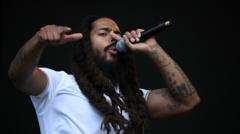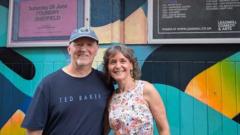Why Did the Government Condemn Glastonbury Chants Broadcasted Live on BBC?

Understanding the Controversy: Politics, Performance, and Public Reaction at Glastonbury Festival
The Glastonbury Festival has long been a platform for artistic expression and social commentary. However, recent events have placed it at the center of a heated political debate. The rap punk duo Bob Vylan's set, marked by chants calling for "death" to the Israeli Defense Forces (IDF), has ignited widespread condemnation from government officials and sparked discussions about free speech, artistic expression, and the responsibilities of broadcasters. This article delves into the incident, the reactions it provoked, and the broader implications for artists and audiences alike.
What Happened at Glastonbury?
During their performance on the West Holts stage, Bob Vylan led the crowd in chants such as "free, free Palestine" and "death, death to the IDF." These statements, broadcast live by the BBC, were met with immediate backlash. A BBC spokesperson described the language used as "deeply offensive," and the broadcaster issued a content warning about the strong and discriminatory language featured during the show. Subsequently, the performance was removed from BBC iPlayer, raising questions about censorship and the role of media in broadcasting controversial content.
The Government's Response
In the wake of the performance, the government swiftly condemned the chants. Culture Secretary Lisa Nandy reached out to BBC Director General Tim Davie to demand an explanation regarding the due diligence the broadcaster exercised before airing such content. The government welcomed the decision not to re-broadcast the performance, emphasizing a stance against hate speech and calls for violence. This incident illustrates the delicate balance between freedom of expression and the potential consequences of inflammatory rhetoric.
Bob Vylan and Kneecap: A Background
Bob Vylan, comprised of rapper Bobby Vylan and guitarist Bobbie Vylan, is known for their socially conscious lyrics and punk-infused sound. Their music often tackles issues of race, inequality, and systemic injustice. Kneecap, an Irish-language rap group, similarly engages with political themes, often addressing Northern Ireland's complex socio-political landscape. Both groups use their platforms to voice dissent and challenge the status quo, albeit in ways that can provoke significant controversy.
Public Sentiment and Artistic Expression
The incident at Glastonbury has polarized public opinion. Supporters of Bob Vylan argue that the duo was exercising their right to free speech, using their art to bring attention to the Palestinian cause. They contend that music has always been a medium for protest and should serve as a reflection of society's struggles. Conversely, critics assert that calls for violence, regardless of the context, should not be tolerated and that artists have a responsibility to promote peace rather than incite hatred.
The Role of the BBC and Media Responsibility
The BBC's decision to air the performance has raised critical questions about media responsibility in broadcasting potentially harmful content. As a public broadcaster, the BBC is tasked with providing a platform for diverse voices while ensuring that content aligns with community standards and legal frameworks. The backlash against the performance highlights the challenges media organizations face when balancing artistic expression with the potential for societal harm.
Legal Considerations and Police Involvement
In the aftermath of the performance, Avon and Somerset Police announced they would review footage of Bob Vylan's and Kneecap's sets to determine whether any offenses had been committed. This investigation underscores the legal ramifications of public performances that engage in politically charged rhetoric. While freedom of speech is a protected right in many jurisdictions, it often intersects with laws regarding hate speech and incitement to violence.
The Broader Context of Artistic Protest
Incidents like the one at Glastonbury are not isolated; they are part of a larger tradition of artistic protest that spans decades. Music festivals have historically served as venues for political expression, with performers often rallying audiences around social issues. From the anti-war sentiments of the 1960s to contemporary movements addressing climate change and racial injustice, artists have utilized their platforms to inspire change and provoke thought.
However, the nature of protest art is evolving. In today's digital age, performances can be broadcast live to millions, amplifying messages that may incite strong reactions. This dynamic raises questions about the responsibility of artists to consider the implications of their words and actions, particularly when addressing sensitive political topics.
The Impact on Future Performances
The repercussions of Bob Vylan's performance may have lasting effects on how artists approach political themes in their work. As artists navigate the complexities of free speech, they may become increasingly cautious about the language they use and the messages they convey. This could lead to a chilling effect where artists shy away from bold statements in favor of more palatable content, potentially stifling creativity and meaningful discourse.
Conclusion: A Call to Reflect on Freedom and Responsibility
The events at Glastonbury Festival serve as a reminder of the intricate relationship between art, politics, and public perception. While the right to free speech is a cornerstone of democratic societies, it comes with the responsibility to consider the impact of one’s words. As we navigate these discussions, it is crucial to foster an environment where diverse voices can be heard while also holding individuals accountable for their rhetoric. This balance is essential for promoting constructive dialogue and understanding in an increasingly polarized world.
Frequently Asked Questions
What were the specific chants made by Bob Vylan at Glastonbury?
Bob Vylan led chants of "free, free Palestine" and "death, death to the IDF" during their performance, sparking significant controversy and backlash.
How did the BBC respond to the incident?
The BBC described some of the comments made during the performance as "deeply offensive" and issued a warning about the discriminatory language. The performance was subsequently removed from BBC iPlayer.
What actions did the government take following the performance?
The government condemned the chants and Culture Secretary Lisa Nandy sought an explanation from the BBC regarding their decision to air the performance. They also welcomed the decision not to re-broadcast it.
Are there legal implications for Bob Vylan’s performance?
Avon and Somerset Police announced they would review footage of the performance to determine if any offenses had been committed that would warrant a criminal investigation.
What does this incident mean for future performances at festivals?
This incident may lead artists to reconsider how they address political themes in their performances, potentially resulting in a more cautious approach to controversial topics.
As we reflect on these events, how do you think artists should balance free expression with social responsibility in their performances? #ArtAndPolitics #FreedomOfSpeech #MusicAndSociety
Published: 2025-06-28 22:07:06 | Category: technology



